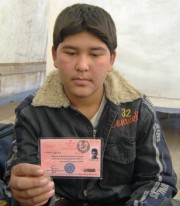HERAT: The more than 1,000 children deported from Iran to Afghanistan’s western province of Herat in 2008 face poverty and are at risk of abuse, according to the UN Children’s Fund (UNICEF) and provincial authorities

An Afghan boy deported from Iran shows his refugee identity card. (IRIN Photo)
Most of the deported teenagers were working as economic migrants in the neighbouring oil-rich country where they are considered “illegal intruders” and qualify for forced expulsion.
Iran has expelled over 720,000 Afghans in the past two years, according to the Afghan Ministry of Refugees and Returnees Affairs (MoRRA).
Tehran has said it will deport all Afghans who live in Iran unlawfully. MoRRA officials estimate that hundreds of thousands of Afghans still live in Iran with no valid residence and/or work permits.
“Every day about 20 children are deported to Herat,” Abdul Qader Rahimi, head of the government human rights commission’s office in Herat Province, told IRIN, adding that some are deported to Nemroz Province, which borders Iran’s Zabol Province.
Poverty and lack of employment opportunities at home force many young Afghan men and children to travel to Iran in search of work. Annual remittances to Afghanistan from Iran are estimated to be around US $500 million, according to a study by the UN Refugee Agency (UNHCR) released in December 2008.
Claims of inhuman treatment
“The [Iranian] police were very violent with me and used very insulting language,” Mohammad Amin, a 16-year-old deportee, told IRIN. Amin said he was not allowed to collect his remaining salary and personal belongings before being deported.
Many other deportees also accused Iranian police of violence, abusive language and inhuman treatment.
The Iranian government has rejected such claims but has repeatedly emphasised its right to arrest and expel all Afghans who live and work in the country without a valid visa or refugee permit.
The UN has acknowledged Iran’s prerogative to deport illegal persons from its territory, but has called for the deportations to be conducted in a “human and gradual” manner.
Aid agencies warn that a complex humanitarian crisis could develop in parts of Afghanistan if Iran pushes for a mass deportation of Afghans in 2009 (as it did in 2007-2008) because the war-wracked country lacks the necessary capacity to absorb large numbers of returnees and already faces many humanitarian challenges.
Prone to abuse
Child deportees are considered prone to sexual exploitation and physical abuse in the immediate aftermath of their expulsion from Iran, child rights activists warn.
“We have very limited capacity and resources to respond to their needs and protect them,” said Rahimi of the human rights commission.
Deportees often have no money to cover their immediate needs, such as food and accommodation, and also cannot afford transport expenses to reach their final destination.
“Child deportees are vulnerable to human trafficking and various exploitations and abuses,” Rahimi warned.



